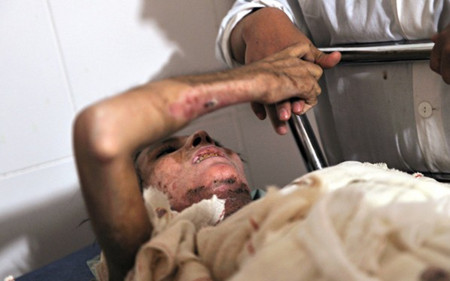By Mina Habib
Zahra struggled for four years to conceal the violent truth about her daughter’s marriage. Twenty-year-old Nafisa’s husband would beat her repeatedly and throw her out of the house, while her mother Zahra did everything she could to keep the batterings a secret.
It was only when Nafisa arrived at her parents’ home with a large black eye that her father realised what was going on and took action to safeguard her.
With the help of the Afghanistan Independent Human Rights Commission, AIHRC, Nafisa is currently seeking a divorce, but the circumstances of her story are depressingly common.
A United Nations report issued last month noted that domestic violence cases often end up being thrown out, or else being sent for mediation when criminal prosecution would be more appropriate.
When cases do get as far as the legal system, the perpetrators often walk free, while abused women may themselves be punished under the loose category of “moral crimes” that include – for women – attempting to escape one’s home.
“As long as women and girls are subject to violence with impunity that violates their human rights, little meaningful and sustainable progress for women’s rights can be achieved,” Georgette Gagnon, human rights director at the UN Assistance Mission to Afghanistan, said in a statement.

Nurse Fatima Mohammadi continued to comfort Hanifa. The choices for Afghan women are extraordinarily restricted: there is little chance for education, little choice about whom a woman marries, no choice at all about her role in her own house. Her primary job is to serve her husband's family. Outside that family, she would be an outcast. (Photo: Lynsey Addario / The New York Times)
Self-immolation among Afghan Women (Photos)
The UN says Afghan prosecutors need to make much more effort to hold violent husbands to account.
The report comes ten years after the Taleban government was ousted and mechanisms to ensure the rule of law and observance of women’s rights were put in place.
In the 12 months to March 2011, the AIHRC recorded 2,229 acts of violence against women that could have been dealt with as criminal offences. Yet prosecutors only brought charges in seven per cent of these cases, and convictions were secured in just four per cent of the total.
According to Afghanistan’s ministry of women’s affairs, 2,400 new cases of violence against women were recorded between April and September this year.
In 2009, Afghanistan acquired a new law on domestic violence, outlawing child and forced marriage, assault and rape.
However, Navi Pillay, UN High Commissioner for Human Rights, says judges are only invoking the law in a small proportion of cases involving violence against women.
“There is a very long way to go before Afghan women are fully protected from violence,” she said in a statement.
Hakima, a 70-year-old resident of Kabul’s Khair Khana district, said husbands did not even need a pretext to assault their wives – it was just the done thing, a way of imposing their authority.
“If a man doesn’t beat his wife, his relatives call him a weakling,” she added.
Fawzia Amini, director of the legal department at the women’s affairs ministry, suggested that changing social values were also a factor, as conservative-minded husbands tried to restrict their wives from claiming basic rights.
“When women are informed about and demand their rights, their men oppose this, and arguments lead to violence,” she said.
Parwin Rahimi, head of women’s rights at the AIHRC, said poverty, unemployment and illegal drug use all contributed to violence – in a general atmosphere of impunity.
Keramatollah Sediq, head of Islamic studies at the Ministry of Hajj and Religious Affairs, said domestic violence occurred because people were unaware of the rules and traditions of Islam. This ignorance led them to hold “absurd” beliefs, he said.
Since the problems seem as great as ever, some commentators are asking why the substantial investment in women’s rights groups and programmes has failed to yield greater results.
Faisal Amin, a social sciences lecturer at Kabul University, said the campaign against domestic violence tended to focus on Kabul, and even there it was limited in scope. Speeches on television and radio were not going to stop men beating their wives, he added.
“The business of eradicating violence against women must be brought out from under the control of a few popular women in Kabul. And more work needs to be done with men,” he said, calling for awareness-raising campaigns in the mosques, and enforcement of the law.
“These things will definitely have positive results,” he said.
Mina Habib is an IWPR-trained contributor in Afghanistan.



